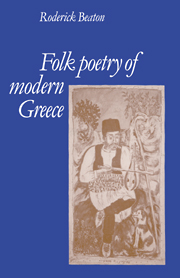Book contents
- Frontmatter
- Contents
- Preface
- Maps
- 1 INTRODUCTION
- 2 THE DEMOTIC TRADITION: THE SONGS
- 3 STRUCTURE OF THE DEMOTIC TRADITION: THE FORMULA
- 4 STRUCTURE OF THE DEMOTIC TRADITION: IMAGERY AND THEMES
- 5 THE EMERGENCE OF THE DEMOTIC TRADITION
- 6 FUNCTION OF THE DEMOTIC TRADITION: THE SONGS AND HISTORY
- 7 THE SONGS AS MYTH
- 8 ONE TRADITION OR SEVERAL?
- 9 THE HISTORICAL TRADITION
- 10 GREEK FOLK POETRY AND WRITING
- Notes
- Glossary of Greek words transliterated in the text
- Bibliography
- Index
9 - THE HISTORICAL TRADITION
Published online by Cambridge University Press: 13 September 2009
- Frontmatter
- Contents
- Preface
- Maps
- 1 INTRODUCTION
- 2 THE DEMOTIC TRADITION: THE SONGS
- 3 STRUCTURE OF THE DEMOTIC TRADITION: THE FORMULA
- 4 STRUCTURE OF THE DEMOTIC TRADITION: IMAGERY AND THEMES
- 5 THE EMERGENCE OF THE DEMOTIC TRADITION
- 6 FUNCTION OF THE DEMOTIC TRADITION: THE SONGS AND HISTORY
- 7 THE SONGS AS MYTH
- 8 ONE TRADITION OR SEVERAL?
- 9 THE HISTORICAL TRADITION
- 10 GREEK FOLK POETRY AND WRITING
- Notes
- Glossary of Greek words transliterated in the text
- Bibliography
- Index
Summary
There is a tendency, among admirers of folk poetry, to equate the ‘folk’ or ‘true folk’ with what is ‘good’. As a result, understandably little attention is paid to types of folk poetry which from an aesthetic point of view are more often mediocre or bad. One may chuckle at the lack of dexterity shown by the English broadside balladist in the lines,
A handkerchief she said she tyed
About his head, and that they tryed;
The sexton they did speak unto
That he the grave would then undo
(Child, 1957, No. 272)or at the incongruity of the Cypriot farmer, who on his own admission could neither read nor write, including in a song of Diyenis the line,
Γράφουν το τά βιβλία μας, δὲν εἶναι παραμύθι
(Notopoulos, 1959, p. 17 and gramophone record)It's written in our books, it's not a folk tale
These absurdities, together with an irritating exactitude about dates and a tendency to moralise, are found in certain Greek songs, as in British broadside ballads, and a number of prominent scholars, such as Francis Child for the British and Stilpon Kyriakidis for the Greek, have in effect refused these songs recognition as part of the folk traditions in which they are found (Child, letter to Grundtvig, in Hustvedt, 1930, p. 254; Kyriakidis, 1965, pp. 107–11). But the mere existence (and persistence) of these incongruous and irritating tendencies in such a wealth of material as the British broadside and the Greek rímes, as they are sometimes called, deserves attention.
- Type
- Chapter
- Information
- Folk Poetry of Modern Greece , pp. 151 - 178Publisher: Cambridge University PressPrint publication year: 1980

